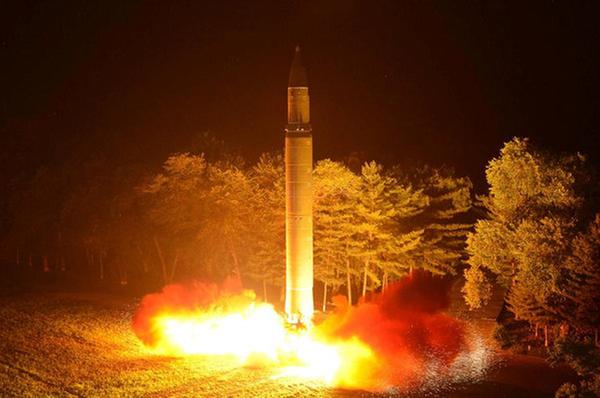US threats won't resolve DPRK issue
By Wen Zongduo | China Daily | Updated: 2017-09-07 07:24
|

|
| Intercontinental ballistic missile (ICBM) Hwasong-14 is pictured during its second test-fire in this undated picture provided by KCNA in Pyongyang on July 29, 2017. KCNA via Agencies |
Following the nuclear test on Sunday, which the Democratic People's Republic of Korea claimed was a hydrogen bomb, US ambassador to the United Nations Nikki Haley told the UN Security Council that DPRK leader Kim Jong-un is "begging for war". The solution she offered was "we must adopt the strongest possible measures", reflecting Trump's hint at military strikes when he said "all options are on the table".
Yet they have ruled out the one diplomatic option considered the most viable first step to resolve the Korean Peninsula nuclear issue-the Chinese and Russian proposal for a "freeze" on the DPRK's nuclear and missile tests in exchange for a "freeze" on large-scale military exercises by the United States and the Republic of Korea. DPRK media have singled out the Aug 21-31 Ulchi Freedom Guardian military drills as the reason for the latest missile and nuclear tests.
Haley's argument that it would be "unwise to trim back training with allies" at a time when the DRPK is threatening the US is poor. The US could have easily chosen another time to exercise its military strength, which would not weaken one bit if it suspends a drill or two.
Trump went on to call the DPRK "a rogue nation", reminding people of former US president George W. Bush's remarks before he ordered the invasion of Iraq that led to the hanging of Saddam Hussein, once a US ally. And the US' role in the removal of Libyan leader Muammar Gadhafi in 2011 long after he had abandoned his nuclear pursuit has given the DPRK one more reason to expedite its nuclear program.
By drumming up war rhetoric, Trump and Haley might provoke the DPRK into conducting more nuclear tests and injecting more uncertainty into Northeast Asian security and economy.
Added to these provocations is Trump's Twitter threat of severing trade ties with countries that carry on trade with the DPRK, a hint at China, which could cripple the regional and global economies leading to an outflow of capital to the "haven" of corporate America and into the hands of some military-financial complex that in turn will use the money to make and sell more killing machines and provide Trump with the luxury of wrestling out "fairer" deals with US allies, even with China.
The excuse of protecting its allies from perceived dangers cannot justify the need for those same allies contributing billions of dollars for more sophisticated weapons and military equipment, not least because fast rising military spending will hike US debts putting its fiscal health at risk, and even pushing it down the abyss of economic dilemma.
Worse, a conflict will set Northeast Asia back by decades, and disrupt China's growth and compromise its role as a global economic driver.
Given their blind faith in the US' eternal supremacy, some Americans have been supporting, if not instigating, the countries that have disputes with China. Yet the South China Sea has calmed down, India has withdrawn its troops from the border, and Central Asia is gradually becoming an integral part of China-proposed Belt and Road Initiative. Only the Korean Peninsula remains a trouble spot thanks to the US' military brinkmanship, which sees China the only challenge it could face. No wonder China has been the target of US accusations.
By delaying the solution to the peninsula issue, the US may find some reason for its military bases in the region and continue to keep the ROK and Japan under its so-called security umbrella. But if it wants peace, it eventually has to hold talks with the DPRK, not trigger a war.
The sad truth is, by threatening preventive strikes against the DPRK, the US is risking the lives of millions of people. For the sake of these millions of people, the US should consider suspending its large-scale military drills in the region and give diplomacy a decent chance to succeed and denuclearize the Korean Peninsula and restore peace across the 38th Parallel.
The author is a senior editor with China Daily. wen@chinadailyhk.com
























